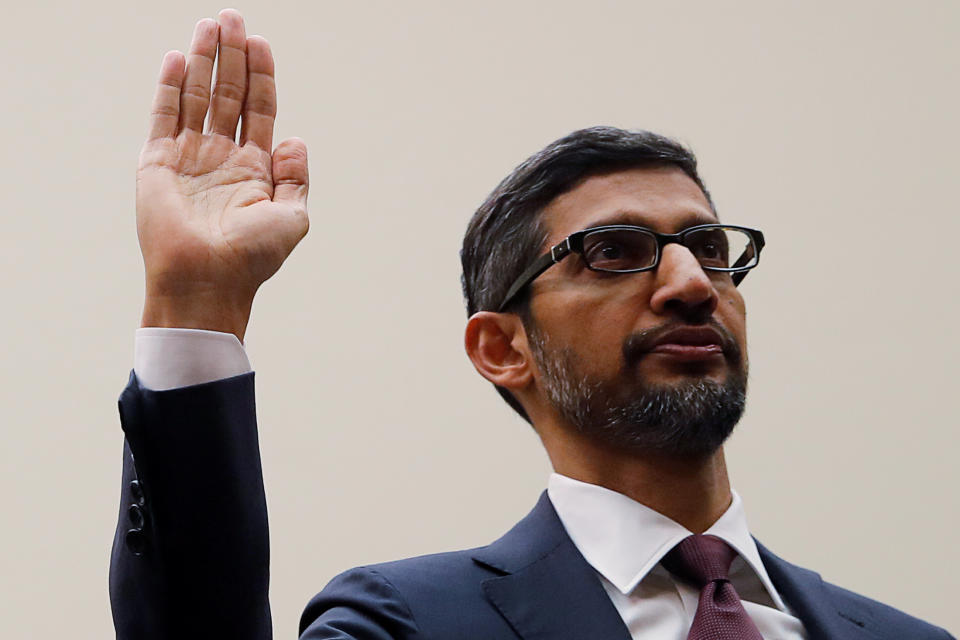Why it could be 'infeasible' to break up Google without destroying its integration
The Justice Department and 11 U.S. states on Tuesday filed a long-expected federal civil lawsuit accusing Google (GOOG) (GOOGL) of illegal anticompetitive conduct in three markets: search, search advertising, and search text.
And department officials told reporters they would ask the court to break the company’s grip on the distribution of those products — though officials didn’t specify how.
Earlier this month, Politico reported that federal and state prosecutors were considering forcing Google to sell its Chrome browser business. The complaint offers additional clues in stating that the distribution methods happen primarily through access points such as Google’s own Chrome browser, Apple’s Safari browser, and others that set Google search as default, as well as through apps on mobile devices and computers.
However, if the government successfully makes its case that Google is operating illegal monopolies in any of the three markets, the case for forcing it to divest Chrome comes with challenges.
“What strikes me as infeasible is breaking up what Google does into separate firms without destroying what is essentially a very highly integrated company,” John E. Lopatka, professor of law at The Pennsylvania State University, told Yahoo Finance. “I don’t see any natural fault line for Google.”

Even prosecutors at this point may not yet have a clear vision as to how to remedy the alleged antitrust violations, according to Lopatka. The suit takes particular aim at deals Google has with device makers like Apple (AAPL), browser developers, and wireless carriers like Yahoo Finance’s parent Verizon (VZ) to make Google the default search engine.
If the Chrome browser is a target, Lopatka said for divestment to be part of an effective fix it would need to come with additional agreements from Google search that it would avoid entering exclusivity contracts that would reposition search as the go-to service for the new Chrome entity.
According to the complaint, more than 85% of all browser usage in the United States occurs on Google’s Chrome browser, or on one of the browsers covered by its revenue sharing agreements.
A ‘complicated’ issue involving free services
And even if prosecutors successfully argue that Google has blocked competitors from entering the search markets, they’re faced with the unique problem of proving how the free services, supplied by free browsers, translate into illegal market competition.
“The thing that makes this complicated both legally and economically is that it’s not clear how much revenue Google earns from its browser,” Lopatka said.

Usually, he explained, it wouldn’t make sense to allege that a company is operating an illegal monopoly when the target entity is not earning revenue because antitrust enforcement is based on concern that monopoly companies can charge a monopoly price for their product.
There's no antitrust violation in winning a competitive struggle by improving a product, Lopatka said, even if that effort is not made to sell at a higher price, but to benefit an ancillary market.
“In this case it's really the browser plus the search engine that’s going to generate the revenue that is going to give Google an advantage and increase its revenue over other firms,” Lopataka said.
In crafting its argument, the Justice Department contended that a Google search does have a price. “When a consumer uses Google, the consumer provides personal information and attention in exchange for search results,” the DOJ lawsuit states. “Google then monetizes the consumer’s information and attention by selling ads.”
‘The browser market matters’
While Lopataka said it could be tough for the Justice Department to force Google to divest the browser, the browser issue is very much on regulators’ radar, according to one of the browser market’s latest entrants, Brave browser founder and CEO Brendan Eich.
“The DOJ, in 2019, started talking to everybody. They called everybody in the valley. Browser is on the agenda,” said Eich, who’s known for co-founding Firefox browser’s parent company Mozilla and for creating JavaScript programming language.
“People who are forgetting about the browser are miscalculating,” Eich added.

To be sure, Chrome is the dominant player, taking up 70% of the global market share for browsers in September, according to Netmarketshare. Still, Eich says it hasn’t reached a level of market saturation that amounts to a monopoly, yet instead helps Google create a monopoly in search.
“It’s obvious that the browser market matters a lot because Google spends billions on it,” Eich said, describing Google as an “inordinate market power” that uses Chrome as a tool in its larger ecosystem. “They are building Chrome to drive traffic to their other services, mainly search.”
Without such a dominant search engine, Eich said, companies such as Apple (AAPL) might have opted to use an alternate default search product, or to build their own, as it did with Safari browser. In addition, he said, coupling Chrome with Search permits Google to bully its way into setting global Web standards, and to tracking user behavior online.
Gabriel Weinberg, founder of search engine DuckDuckGo, which was mentioned in the government’s complaint as one of the search products working to compete against Google, said Google is exploiting the browser market in conjunction with a search monopoly “to restrict user choice.”

“We’re pleased the DOJ has taken this key step in holding Google accountable for the ways it has blocked competition, locked people into using its products, and achieved a market position so dominant they refuse to even talk about it out loud,” Weinberg said.
In Eich’s estimation, without major changes, Chrome’s market share is destined to erode with or without the DOJs intervention, due to consumers’ privacy and security demands that are fueling shifts from browsers that don’t give users the efficiency and privacy they are starting to demand.
An unorthodox antitrust remedy
Mark Patterson, professor of law at Fordham University Law School, proposed a different remedy in an email to Yahoo Finance. He called the government’s lawsuit against Google incomplete for failing to address what he sees as the real competitive problem.
“The complaint seeks to restore ‘competition’ by making it harder for Google to be the default search engine. But there are so many places and ways for Google to encourage users to switch to its search engine that I am not convinced this will change things significantly,” Patterson said. “What might work is to require, when a user searches, that a search engine reveal how much money it makes from the search and where that money comes from. Then consumers could infer how much trust to give to search results.”
Ultimately, whether prosecutors seek Google’s divestment of Chrome may depend on how Google explains Chrome’s place in its ecosystem.
Yahoo Finance reached out to Google for a response to the DOJ’s lawsuit and to inquire about its position in response to reports that the DOJ may seek Chrome’s divestment. It did not receive a response by the time this story was published.
Alexis Keenan is a legal reporter for Yahoo Finance and former litigation attorney.
Read more:
Google search is an illegal monopoly, DOJ and states allege in lawsuit
Amazon Prime Day is about making you a customer for life
Apple’s app store war doesn’t end with Epic
‘Dangerous for Democracy’: Big tech hearing gives clues on future of antitrust law
Follow Alexis Keenan on Twitter @alexiskweed.
Follow Yahoo Finance on Twitter, Facebook, Instagram, Flipboard, SmartNews, LinkedIn, YouTube, and reddit.
Find live stock market quotes and the latest business and finance news
For tutorials and information on investing and trading stocks, check out Cashay
